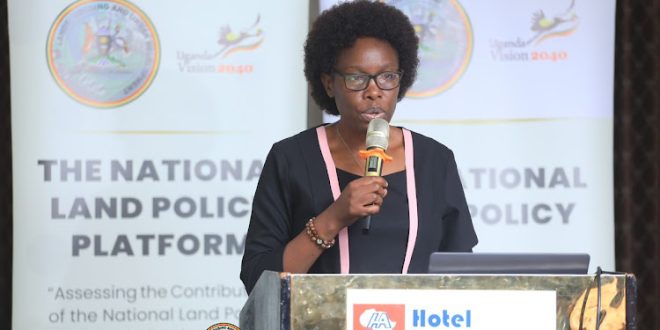UGANDA, Kampala | Real Muloodi News | The Ugandan government is currently conducting a comprehensive review of the National Land Policy, a critical framework that was initially approved by the cabinet back in 2013.
The objective of this revision is to ensure that land use is both equitable and sustainable while promoting productivity.
This important update was announced by the Minister of Lands, Hon. Judith Nabakooba, during a conference held under the theme of “Assessing the contribution of the National Land Policy to the Optimal Use and Management of Uganda’s Land Resources.”
This review has become essential due to the identification of various gaps, challenges, and emerging issues during the policy’s implementation.
Minister Nabakooba emphasised the need to focus on core land administration functions and how the Ministry of Lands can contribute to Uganda’s development.
This includes aspects such as land valuation and taxation, land acquisition by the government, secured lending, rent, land transactions, land-related taxes, and zoning.
Also, a critical aspect that will be examined is the issuance of development permits to investors, housing and real estate development, and construction management.
Addressing issues related to land tenure security, Minister Nabakooba pointed out that there are ongoing challenges arising from the documentation and registration of land.
A substantial percentage of land in Uganda remains unregistered, and this issue leads to numerous land disputes. She stressed the importance of appreciating surveying as a means to address these disputes effectively.
Moreover, Minister Nabakooba appealed to local government leaders, particularly local councils, to actively engage in addressing the issue of land grabbing.
Their vigilance and involvement can play a crucial role in upholding the rule of law. It is important to note that unresolved land cases have led to case backlogs in the courts of law, further highlighting the need for urgent action.
Dr. Kobusingye Doreen, the lead researcher, identified several new issues and gaps in the National Land Policy. These issues are primarily related to the allocation and alignment with the National Development Plan III (NDP III).
Coordination among agencies responsible for achieving the program’s goals, particularly the Land Management sub-programme Agencies, remains a significant challenge.
Additionally, limited data for measuring evidence-based program performance and insufficient funding and staffing levels have been identified as concerns.
The limitations on land sizes for planning purposes, particularly in reference plots and kibanja, present obstacles, as do the lack of guidelines and standards for upgrading urban centres.
Limited digitisation of natural resource management activities also contributes to the persistent challenge of encroachment.
Dr. Kobusingye emphasised the pressing issues of continued encroachment and the issuance of illegal land titles in Central Forest Reserves and Local Forest Reserves. Notably, the unauthorised issuance of land titles in wetlands has led to numerous litigation costs.
The comprehensive review of the National Land Policy aims to address existing challenges and ensure that land use in Uganda is equitable, sustainable, and productive.
The government’s commitment to reviewing and updating this policy is a significant step toward more efficient land management and reduced land-related disputes.
READ MORE LIKE THIS:
Christopher Burke: Uganda’s National Land Information System
Nabakooba Blames Land Brokers and Politicians for Rampant Land Grabbing Cases



